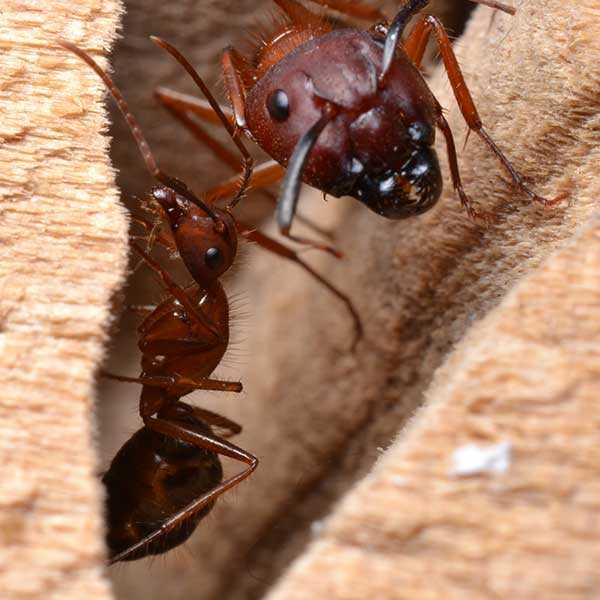As one of the most common wood-destroying insects, carpenter ants are well known for their capability for widespread destruction. They can tunnel out support beams, collapse wall supports, and destroy a house from the inside out. Unlike termites, carpenter ants don’t eat wood–they remove it from their tunnels. Carpenter ants also nest within these tunnels.
Identifying Carpenter Ants
There are more than 1,000 species of carpenter ants. Larger in size than most ants in the Pacific Northwest, queen carpenter ants can range from 16-18 millimeters long, while worker ants range from 6-13 millimeters long. While many carpenter ants are black in appearance, they can also be red or brown in color. Carpenter ants can be highly destructive to structural wood beams and other areas, like woodpiles, furniture, or sheds.
Indications that You Have Carpenter Ants
Carpenter ants don’t eat wood like termites, but instead, create tunnels called “galleries”, and the sawdust-like material (called frass) left from their destruction can be a key indicator of carpenter ant activity. Look for these signs to see if you have a carpenter ant problem:
- Piles of sawdust-like material
- “Kickout” holes, from where carpenter ants have kicked out sawdust
- Discarded wings around door frames, window frames, etc.
- Flying carpenter ants inside the house
If you see any of these signs, call a professional exterminator who has experience with carpenter ants. It’s impossible to tell how far the colony has spread, or where they might be within the walls, without careful inspection. The faster you find the issue, the faster you can eliminate the problem and minimize damage.
Treating for Carpenter Ants
Inspection is the first and major step towards getting rid of carpenter ants. An exterminator who is familiar with carpenter ants is your best bet for getting a thorough and comprehensive investigation. Carpenter ants engage in “budding” behaviors: they will establish a single nest, build it to capacity, and then send out new queens to establish satellite nests. This is a huge problem, because once they begin to spread, it gets more and more difficult to find each and every one of the nests.
After inspection and confirmed carpenter ant nest discovery, there are steps that you should take immediately:
- Fix all leaks, so they can’t dampen wood
- Remove all damp wood
- Seal all potential entrances into the walls or home.
- Commit to inspecting the exterior of your home four times a year. Professional inspections are a great way to make sure you’re protected.
Complete elimination may be more complicated. Once carpenter ants are within your home’s walls, professionals will need to remove them. Fully removing carpenter ants takes time, as all nests will have to be identified.
How to Get Rid of Carpenter Ants
If you’ve taken steps to prevent carpenter ants and you still have them in your home, contact PURCOR. We use Integrated Pest Management (IPM) to get rid of your pest issues, using our knowledge of their habits and behavior to eliminate them completely. You don’t need to battle carpenter ants alone–give us a call today!
"*" indicates required fields
"*" indicates required fields




